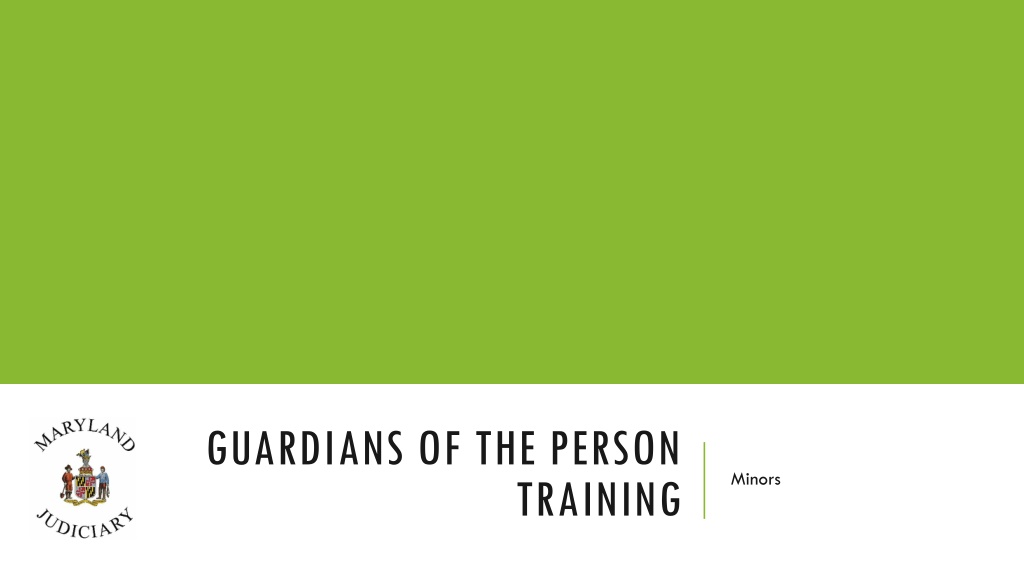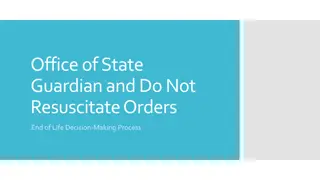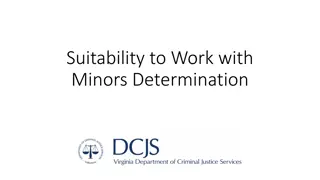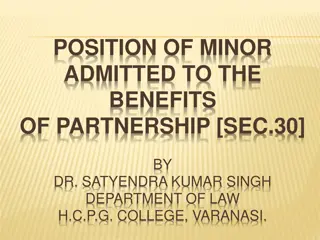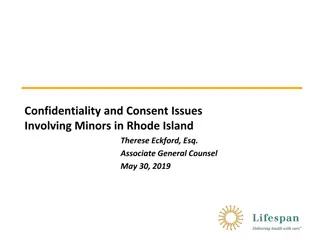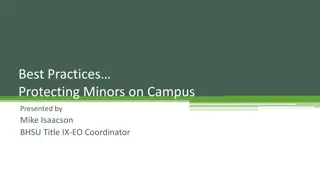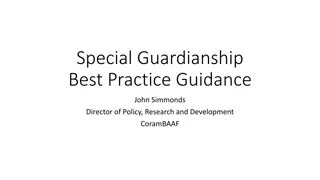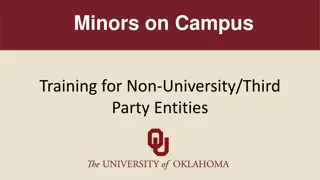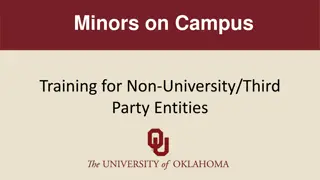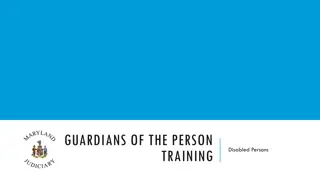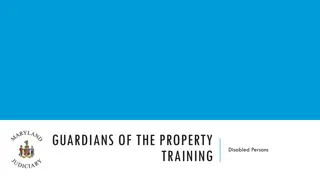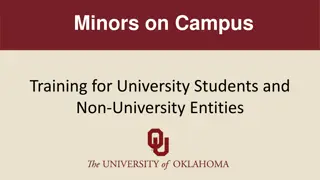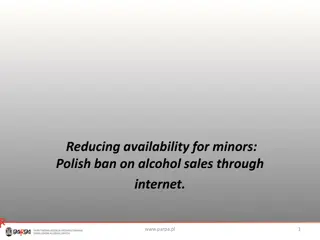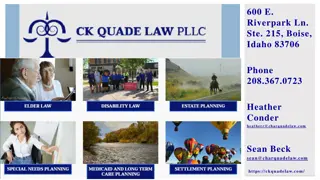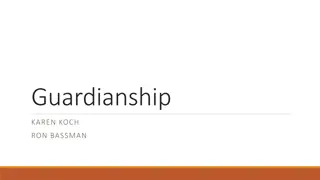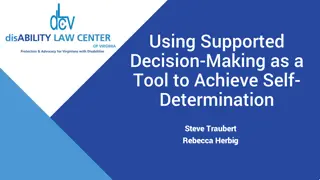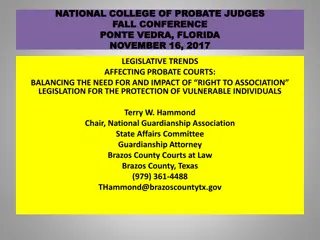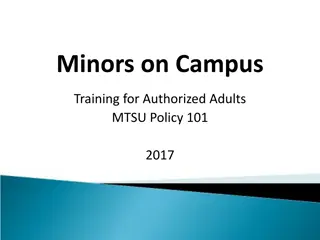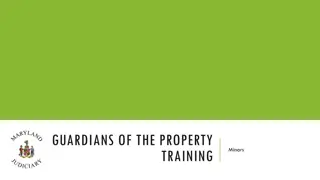Understanding Guardianship of Minors and Their Rights
Guardianship is a legal process where the court appoints a person to manage a minor's affairs. This involves overseeing the minor's person, property, or both. The court plays a vital role in monitoring the guardianship, addressing any issues that may arise. Guardians can be of two types: Guardian of the Person and Guardian of the Property. Interested Persons, including the minor, parents, siblings, and others named by the court, have a stake in guardianship proceedings. Learn about the terms, roles, and responsibilities involved in guardianship to ensure the well-being of minors and their assets.
Download Presentation

Please find below an Image/Link to download the presentation.
The content on the website is provided AS IS for your information and personal use only. It may not be sold, licensed, or shared on other websites without obtaining consent from the author. Download presentation by click this link. If you encounter any issues during the download, it is possible that the publisher has removed the file from their server.
E N D
Presentation Transcript
GUARDIANS OF THE PERSON Minors TRAINING
WELCOME Part 1: Guardianship terms Part 2: Role, powers, and duties Part 3: Abuse, neglect, and exploitation Part 4: Changes to the guardianship
PART 1: GUARDIANSHIP TERMS Guardianship terms Guardianship Minor Court Guardian Guardianship Estate Clerk/Trust Clerk/Register of Wills Interested Persons
GUARDIANSHIP Guardianship is a legal proceeding in which the court appoints a person to manage the affairs of a minor s person, property, or both.
MINOR Lacks the legal capacity to provide for his or her daily needs or manage financial affairs. Person under the age of 18 who is under guardianship. Also called: Ward
COURT The court is the ultimate guardian You are its agent Monitors the guardianship Review reports Address issue or problems
GUARDIAN Two types: 1. Guardian of the Person 2. Guardian of the Property (Fiduciary) Co-Guardians
GUARDIANSHIP ESTATE The minor s assets (property) under guardianship, including any: Income Real or personal property Benefits Stocks, bonds, investments
CLERK/TRUST CLERK/REGISTER OF WILLS Court employee whose responsibilities may include: Managing the guardianship case Processing all case paperwork Collecting fees Providing court forms Sending out notices Answering questions about court process Reviewing reports Reporting problems to the court
INTERESTED PERSONS The law defines Interested Persons in a guardianship to include: The minor The minor s Parents Siblings (aged 18+) Heirs Agencies the minor receive benefits and services from Any other persons named by the court
PART 2: ROLE, POWERS, DUTIES Role, powers, and duties Filing and reporting requirements
ROLE AND POSSIBLE POWERS 1. Providing food, shelter, clothing, and care for the minor Arranging for food, clothing, social, recreation, training, educational needs 2. Caring for the minor s personal items Taking reasonable care of clothing, furniture, vehicles, other personal items Taking steps to protect property 3. Arranging for services and care Finding government or private services and resources Working with the guardian of the property or Representative Payee (if any) to apply on behalf of the minor 4. Requesting funds for the minor s care from the guardian of the property Arranging for payment of expenses related to minor s care, comfort, well-being Working with the guardian of the property or Representative Payee (if any) to pay expenses out of the guardianship estate 5. Giving necessary consent or approval for medical or other professional care Coordinating and consenting to medical care, treatment, counseling, services Some treatment requires court authorization
COURT AUTHORIZATION You MUST get prior court authorization BEFORE: Performing any action not authorized in the order appointing you as guardian Moving the minor from one type of housing to another Committing the minor to a mental-health facility Starting, stopping, or withholding medical treatment that would involve a substantial risk to life of the minor Ask the court for permission in writing
FILING AND REPORTING REQUIREMENTS Annual Report file each year within 60 days of appointment date Example: Date of March 1, 2017 Appointment Each year by April 30th Account Due Use forms: Circuit Court Form CC-GN-013 Orphans Court Form: Form RW1342 Complete the entire form Write not applicable in sections where you have no information to include
DECISION-MAKING Best interest of the Child Standard Medical Decisions Educational Decisions Community Resources
Age, gender, and health All possibilities DECISION-MAKING Preferences and interests Religious and cultural beliefs Your decisions affect the safety, health, and well-being of the minor Proximity to relatives, friends, and others Use the Best interest of the Child Standard Choose the option with the most benefits and the least harm Consider how decisions about your life will impact the minor School and social life Employment and recreation Educational needs Independent opinions
Use when making decisions about the minor s care, treatment, or services INFORMED CONSENT Nature/ Purpose Second Opinions Risks Informed Consent Alternatives Benefits
MEDICAL DECISIONS Medical Insurance Add minor to insurance plan Coverage through the state? Local Department of Social Services (DSS) You are the minor s advocate Ask questions Risks vs. benefits of treatment Alternatives Get second opinions If you don t know what to do, talk to the court!
EDUCATIONAL DECISIONS Notify school administrator Monitor minor s performance Meet with teachers Provide academic support Costs May be payable from the guardianship estate Tutors Psychoeducational testing Extracurricular activities Education expense Best interest of the child standard applies
COMMUNITY RESOURCES Services and Resources Federal agencies State agencies County agencies Private agencies Program Eligibility Means-based or other requirements Payable through certain government programs
MARYLAND COMMUNITY SERVICES LOCATOR Online directory Housing Food Clothing Medical and mental health care Education resources Recreation resources Family support Job readiness/employment More www.mdcsl.org
COMMUNITY RESOURCES Health care In-home aide services for minors with disabilities Mental and behavioral health resources Legal advocacy Public benefit eligibility Social, recreational, and educational programs Crisis intervention Information and referrals to community services and resources *Program Eligibility
PART 3: ABUSE, NEGLECT, AND EXPLOITATION Types and signs People under guardianship often targeted because of: Age Physical, intellectual, or emotional limitations Dependence on others for basic needs Inability to communicate they are being hurt Limited ability to recognize and avoid danger A signal indicator is usually not proof Look for patterns or suggestions of a problem Victims of crime can suffer from physical psychological, and financial injuries
PHYSICAL ABUSE Complaint Unexplained or poorly explained injuries Use of force that may result on bodily injury, physical pain, or impairment Fractures, sprains, dislocations, bleeding Hitting, beating, pushing, shoving, shaking, or slapping Bruises, bites, cuts, sores, burns, scars, head trauma Behavior Changes Signs Withdrawal, aggression, regression, depression Substance abuse, attempts to escape, wariness, fear Sudden Changes Kicking, pinching, choking, hair pulling, or burning Weight loss, tooth loss, or hair loss Use of drugs or physical restraints, force-feeding, reckless driving, physical punishment Different explanations for injuries Fear of a particular person Frequent/suspicious hospitalizations Delays in treatment Other
SEXUAL ABUSE Complaint Nonconsensual sexual contact of any kind Injuries Includes: Rape and molestation Sexual conduct with a person unable to consent Behavior Changes Victims include: Women and men Children and people with disabilities especially vulnerable Inappropriate, unusual, or aggressive behavior Bedwetting, sleep disruptions Fear of the dark, avoids undressing, overdresses Signs
EMOTIONAL ABUSE Complaint The infliction of pain, anguish, or distress Changes Verbal assaults, insults, threats Weight loss or gain Depression, confusion, agitation, withdrawal Physical signs Also known as psychological abuse Signs Intimidation, humiliation, harassment Rashes, hives, facial tics, stomach aches, elevated blood pressure Isolation from family, friends, activities Nervous habits (biting, rocking, head- banging, bedwetting, thumb sucking)
PERPETRATORS OF ABUSE Can be anyone Often someone the victim knows Family members Acquaintances Dating partners Caregivers
NEGLECT Poor hygiene (lice, scabies, severe or untreated rashes or wounds, bedsores) A caregiver s refusal or failure to provide for a person s basic needs Food, water, clothing, shelter Personal hygiene, medication, comfort, personal safety Malnutrition or dehydration Hazardous or unsafe conditions (bad wiring, no heat, poor plumbing, unsanitary conditions) Dirt, fleas, bed bugs, soiled bedding, odors Passive neglect Caregiver unable to fulfill obligations Inadequate clothing, lack of basic medical care or medications Intentional neglect Caregiver able to but refuses to fulfill obligations Exposure to elements (sunburn, bites, cold) Neglectors can be family members, caregivers, or staff at care facilities Behaviors that are not age-appropriate (wetting, soiling)
RESPONDING TO SUSPECTED ABUSE OR NEGLECT If someone is in immediate danger, call 9-1-1. Suspect abuse? Child Protective Services (under 18 years old) Adult Protective Services (over 18 years old) Investigate concerns about the safety or well-being of children and vulnerable adults Offer services and support Leave investigation to the professionals
PREVENTING ABUSE AND NEGLECT Visiting the person under guardianship Monitor care Track changes Behavior, physical appearance, physical surroundings Specific complaints Unexplained injuries or conflicting explanations Depression, fear, agitation, withdrawal Appropriate clothing, hygiene, living space Track people Specific complaint Reluctance/unwillingness to see certain people Interference by others Is money paid being used properly? Receiving proper care? Food, housing, clothing needs met? Suspicious doctor/hospital visits? Conflicting explanations for injuries?
PART 4: CHANGES TO THE GUARDIANSHIP Termination Resignation Removal End of Appointment
TERMINATION The guardianship can terminate when: Minor turns 18 Becomes emancipated (marriage) Minor dies Petition to terminate filed by a parent Turns 18 Include a copy of birth certificate or other proof of age Emancipation by married Include a copy of marriage certificate File Petition to Terminate the Guardianship Within 45 days Show cause order Mail to Interested Persons Hearing Minors with disabilities File: Petition for Guardianship of Alleged Disabled Person (Form CC-GN-002) Death of minor Include a copy of death certificate Continue responsibilities until the court orders termination of the guardianship
RESIGNATION No longer able to serve? Petition to Resign as Guardian May request: Substituted or Successor Guardian (replacement) Show cause order Resignation not automatic Court order accepting your resignation Continue responsibilities as guardian
REMOVAL Removal as guardian Court Show cause Petition from Interested person Hearing Removal Perform neglected duties Other sanctions Removal not automatic Court order removing you as guardian Continue responsibilities
END OF APPOINTMENT Rights and responsibilities end upon termination Does not discharge you from liability for wrongful acts
QUESTIONS? Visit: www.mdcourts.gov/guardianship Forms Videos Resources
GUARDIANS OF THE PERSON Minors TRAINING
